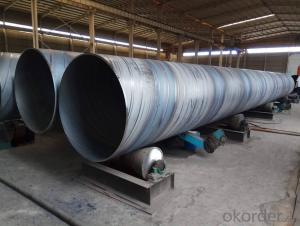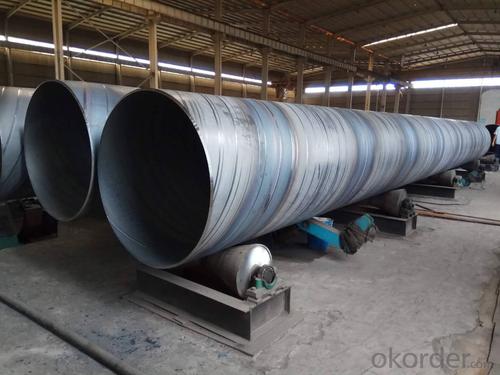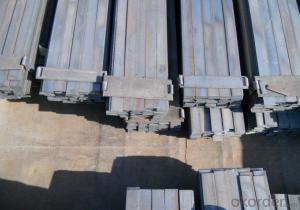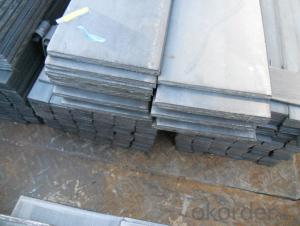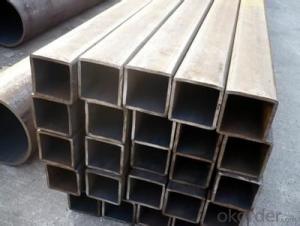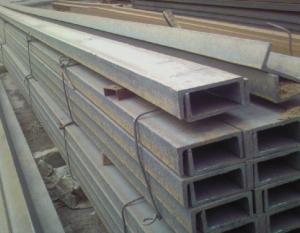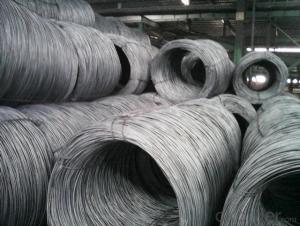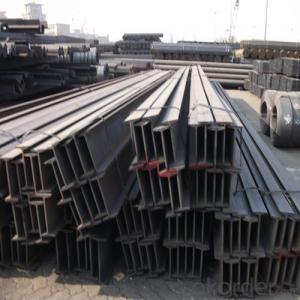Spiral steel tube q235b spiral steel tube
- Loading Port:
- Tianjin
- Payment Terms:
- TT OR LC
- Min Order Qty:
- 34 m.t
- Supply Capability:
- 23556 m.t/month
OKorder Service Pledge
OKorder Financial Service
You Might Also Like
Specification
The spiral pipe welding process is also the difference between SSAW and LSAW, which is the form of welding seam. The difference between SAW and ERW is the difference of welding process. According to the production method, steel pipe can be divided into two categories: seamless steel pipe and welded steel pipe. According to the production method, seamless steel pipe can be divided into: hot rolled seamless pipe, cold drawn pipe, precision steel pipe, hot expansion pipe, cold spinning pipe and extrusion pipe. Seamless steel tubes are made of high quality carbon steel or alloy steel.Commonly used standards of the spiral steel pipe can be divided into: SY/T5037-2008 (solid, also known as the common fluid conveying pipe with spiral seam submerged arc welding steel pipe), GB/T9711.1-2008 (national standard, also known as oil and gas industry conveying pipe delivery technical conditions in the first part: grade A steel pipe (GB/T9711.2 strict grade B steel pipe)), API 5 l (American petroleum institute, also known as the pipeline steel pipe; Two grades: PSL1 and PSL2), SY/ t5040-2008 (spiral welded steel pipe for pile)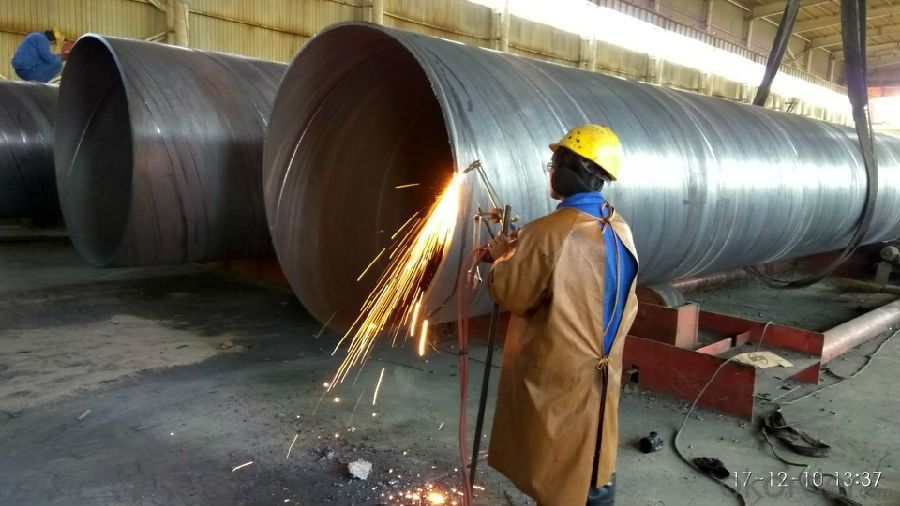
Large diameter welded pipe is mostly spiral welding.
The commonly used helical pipe materials for structural reinforcement are as follows: Q235A, Q235B, Q345, L245, L290, X42, X52, X60, X70, X80, 0Cr13, 1Cr17, 00Cr19Ni11, 1Cr18Ni9, 0Cr18Ni11Nb.
The reinforced spiral pipe used for structure is mainly used in water engineering, petrochemical industry, chemical industry, electric power industry, agricultural irrigation and urban construction. Liquid transport: water supply, drainage, sewage treatment engineering, mud transport, Marine water transport. For gas transmission: gas, steam, LPG. For structure: piling pipe and bridge; Wharf, road, building structure pipe, Marine piling pipe, etc
- Q: What is the role of steel pipes in the mining and extraction of minerals?
- Steel pipes play a critical role in the mining and extraction of minerals as they are used for various applications throughout the process. These durable pipes are commonly employed to transport and distribute water, chemicals, and compressed air to different areas of the mine. Additionally, steel pipes are utilized in the construction of mine shafts, tunnels, and underground structures, providing stability and support. Their ability to withstand harsh conditions, resistance to corrosion, and high strength make steel pipes an indispensable component in the mining industry.
- Q: Can steel pipes be galvanized?
- Yes, steel pipes can be galvanized. Galvanizing is a process of applying a protective zinc coating to steel or iron to prevent corrosion. The steel pipes are submerged in a bath of molten zinc, which forms a metallurgical bond with the steel, creating a corrosion-resistant coating. Galvanizing is commonly used in various applications, such as plumbing, construction, and outdoor structures, to extend the lifespan of steel pipes and prevent rusting.
- Q: Can steel pipes be used for underground cooling systems?
- Indeed, underground cooling systems can make use of steel pipes. Thanks to their durability, strength, and resistance to corrosion, steel pipes are widely employed in numerous applications, including underground cooling systems. They are adept at handling the rigorous demands of cooling systems, such as high pressure and temperature requirements. Moreover, steel pipes can be conveniently installed and maintained by means of welding or threading them together. Nonetheless, it is crucial to ensure that the steel pipes are adequately coated or insulated in order to avert corrosion and uphold heat transfer efficiency.
- Q: How to identify stainless steel pipe and steel pipe?
- Steel pipe according to the production method can be divided into two categories: seamless steel pipe and pipe joints, pipe joints as welded steel pipe.1. seamless steel tube according to the production methods can be divided into: hot-rolled seamless pipe, cold drawn tube, precision steel tube, heat expansion tube, cold spinning tube and extrusion tube.Seamless steel tubes are made of high quality carbon or alloy steel. They are hot-rolled and cold-rolled (drawn).Bundled steel pipe2. welded steel pipe for different welding process and divided into the furnace pipe welding (ERW) pipe and automatic arc welding, because of the different forms of welding seam welded pipe and spiral welded pipe is divided into two kinds, end its shape is divided into circular welded and shaped (square, flat) pipe.
- Q: Are steel pipes suitable for use in chemical plants?
- Yes, steel pipes are suitable for use in chemical plants. Steel pipes have excellent resistance to corrosion and high temperatures, making them ideal for transporting various chemicals and fluids in a safe and efficient manner. Their strength, durability, and versatility make them a preferred choice in the chemical industry.
- Q: How are steel pipes used in the manufacturing of appliances?
- Steel pipes are commonly used in the manufacturing of appliances for various purposes such as transporting fluids, gases, and air within the appliance, providing structural support, and acting as conduits for electrical wiring. They are also used for creating ventilation systems and heat transfer mechanisms, ensuring efficient operation and durability of appliances.
- Q: What are the main types of steel pipe ah? How to judge which kind of steel pipe performance is better?
- Sort by connectionThe connection way of steel pipe can be divided into: light pipe (pipe end without thread) and wire tube (Guan Duan with thread).The tube can be divided into ordinary tube and end tube.Thickening of the tube can also be divided into: extra thick (with external thread), internal thickening (with internal thread) and inside and outside thickening (with internal and external thread) and other vehicle wire tube.The wire tube can also be divided into ordinary cylinder or taper thread and special thread.In addition, according to user needs, wire tubes are generally equipped with pipe delivery.Plating characteristicsAccording to the characteristics of surface coated steel pipe can be divided into: Clarinet (not coated) and coating tube.The coating tubes include galvanized pipes, aluminium plated tubes, chrome plated pipes, aluminized tubes and other alloy layers.The coating tube has an outer coating tube, an inner coating tube and an inner and outer coating pipe. The commonly used coatings are plastics, epoxy resins, coal tar, epoxy resins, and various glass based anticorrosive coatings. Galvanized pipe is divided into KBG pipe, JDG pipe, threaded pipe, etc.
- Q: Are steel pipes suitable for solar power plants?
- Indeed, solar power plants find steel pipes to be a fitting choice. Owing to their enduring nature, resilience, and ability to resist corrosion, steel pipes are commonly employed in the construction of solar power plants. They serve diverse purposes within these plants, encompassing the conveyance of fluids like water or heat transfer fluids, as well as proffering structural reinforcement for solar panels and other apparatus. Steel pipes excel at enduring high temperatures and pressure, thus rendering them an optimal choice for the efficient functioning of solar power plants. Moreover, steel pipes are readily obtainable and cost-effective, thereby establishing their popularity in the construction of solar power plants.
- Q: What are the different types of steel pipe coatings?
- There are several types of steel pipe coatings, including epoxy coatings, polyethylene coatings, polyurethane coatings, and zinc coatings.
- Q: How are steel pipes classified based on their thickness?
- Steel pipes are classified based on their thickness into three categories: standard, extra strong, and double extra strong.
Send your message to us
Spiral steel tube q235b spiral steel tube
- Loading Port:
- Tianjin
- Payment Terms:
- TT OR LC
- Min Order Qty:
- 34 m.t
- Supply Capability:
- 23556 m.t/month
OKorder Service Pledge
OKorder Financial Service
Similar products
Hot products
Hot Searches
Related keywords
